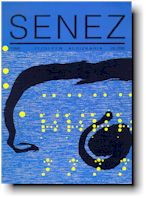Senez 20 (1998)

- Date of publication: 1998
- ISSN: 84-7086-287-1
- L.D.: SS 1196/98
- 112 pp.
All articles in this issue have been published in Basque.
Presentation
Koldo Biguri
Translation: Juan Mari Mendizabal
The reader will have to bear with me if the presentation of the current issue begins with a personal point of view, but now that I am leaving the post of chief editor, I cannot help looking back at the nine years which have elapsed since I took charge of this magazine before leaving it in the hands of Gotzon Egia, who is going to be the new chief editor from the next issue on.
Nine years is a long enough time to study such evolution, reflecting on the bittersweet episodes during that period. Fortunately, at a quick glance, there appears to be more sweet than sour, if we look at the situation both of the magazine itself and of the broad field of Basque translation. As regards the magazine, there is no doubt that, for the Association of Basque Translators, Proofreaders and Interpreters — being a small professional association —, to keep on publishing a magazine of this sort for fourteen years, mostly thanks to the enthusiasm of those producing it, has been an achievement to be proud of. To be proud of, I say, because our association is not a research organisation, although it does research work, because it is not a translators school, although it imparts classes, and because it is not a cultural association, although it does great cultural work. All of this, and this magazine as well, is the fruit of the work carried out by a reduced group of tenacious and enthusiastic people.
Continuing with the sweet part, mention must be made of the diffusion and blossoming that Basque translation in general has known during these years in all fields, and we can look into the future with hope knowing, besides, that all of this is to a great extent the result of the work and cooperation of those of us who have come together around the Associations project.
There is a bitter part as well, of course, as we all know. Even though it made enormous progress, Basque translation has not yet achieved the same functions and level of acceptance as in linguistically standardised societies, because for some sectors it still is an activity which is sidelined or not sufficiently appreciated. Much work has to be done in this direction. That is not the translators responsibility alone, though.
On the other hand, regarding official translation studies, the Master in Translation at the University of the Basque Country is the only one left, but it still has not taken the step to becoming a university degree, although this seems to be imminent. This means, among other things, no research work is being undertaken in our university around the topic of Basque translation — as if we were not in dire need of it! The articles published in this magazine and the seminars organised by EIZIE (together with the summer courses that the University of the Basque Country organises through EIZIE and the courses given by EIZIE members at the UEU [Summer Basque University]) are the sole humble efforts made towards filling this gap efforts that are bound to be modest before such a huge task. Basque translation (we say this over and over again) needs university studies, it needs professionals with a university level training, it needs researchers and research work based on solid scientific ground, in order to strengthen and spread the roots of the progress achieved so far. The very future of this magazine may depend on this.
But meanwhile we carry on in the same way in this issue as well. Amongst the contents there is an interview with the winner of the Euskadi Award for Translation, a few articles resulting from the seminars organised by EIZIE, some collaborations sent by members of the association, as well as a witty text around Translatology from the magazine Vasos Comunicantes.
Before concluding, and coming back to the personal field, I would like to thank all those who made contributions to the magazine, either prompted by my necessary requests or of their own free will. I hope — I am sure, actually — that they will be as understanding and as good colleagues to the new chief editor as they have been to me.
All the best,
Koldo Biguri, July 1998.



